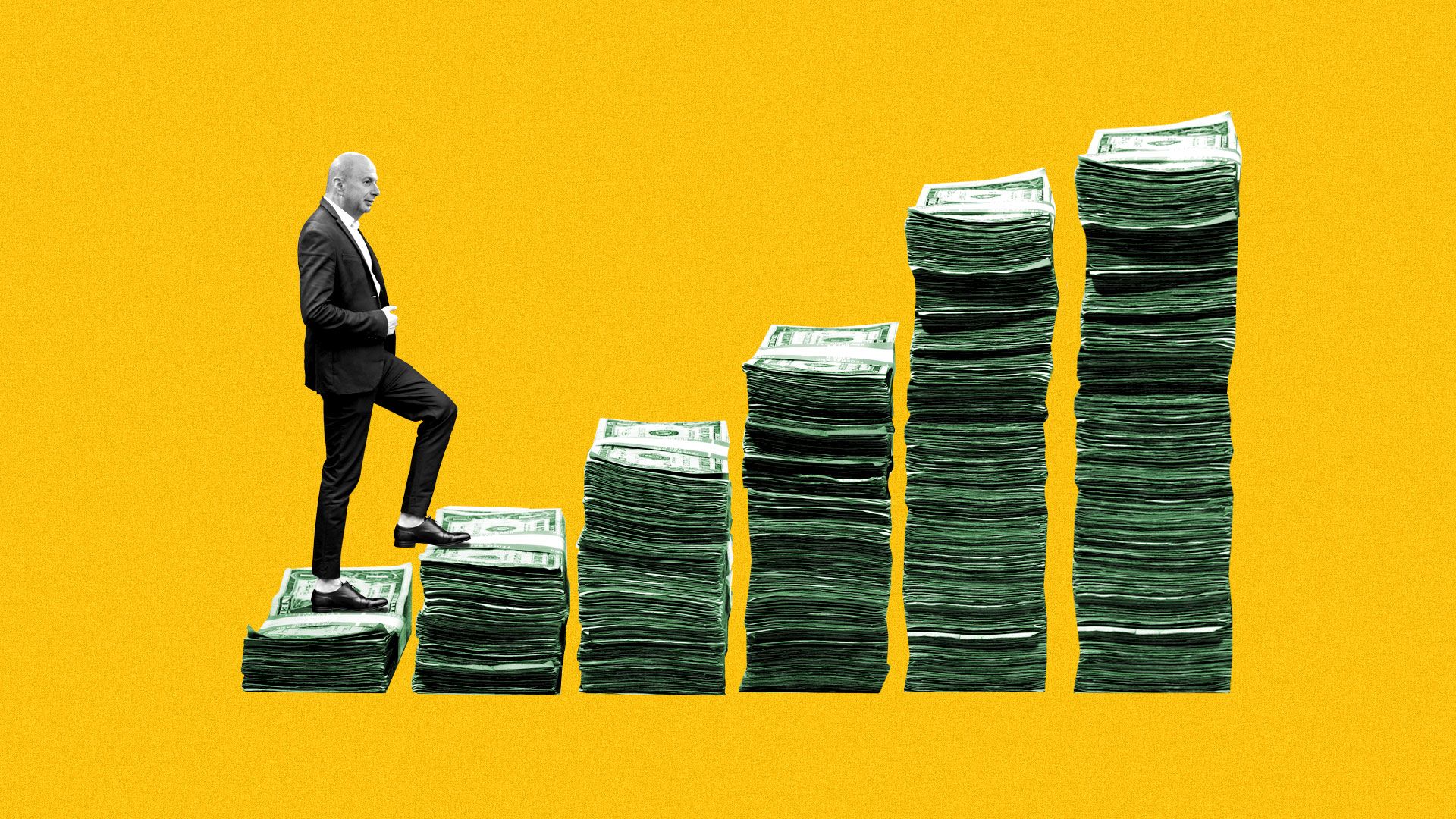Inside Gordon Sondland's pay-to-play power grab
Add Axios as your preferred source to
see more of our stories on Google.

Photo Illustration: Eniola Odetunde. Photos: Pool/Getty Images
When Gordon Sondland arrived at the Trump fundraising breakfast at Manhattan's Cipriani restaurant on Dec. 7, 2016, he had trouble getting in. Sondland hadn't sent his RSVP, he hadn't sent any money and the Secret Service had not cleared him to enter.
The backdrop: Trump transition team officials had no affection for the hotelier. The last time Sondland had been on the campaign's radar was when, through a spokesperson, he publicly denounced Trump's character and canceled a fundraiser he was scheduled to co-host. That was August 2016, after Trump lambasted Gold Star father Khizr Khan. Key officials noted Sondland’s denunciation, and they hadn’t let it go.
Behind the scenes: Sondland had another problem that December morning. He was ready to spend big to get back into Trump's good graces and had brought with him checks totaling $1 million, made out from multiple LLCs. But donors at this breakfast were legally only allowed to give a maximum of $5,000 each.
- Sondland's million-dollar contribution was made out to the Trump Inauguration, so the transition team — a legally separate entity, which was running the Cipriani breakfast — couldn't take it.
- Trump mockingly (and accurately) captured the motives of many in his audience that day — roughly 1,000 D.C. lobbyists and businesspeople eager to get back into Trump's good graces — when he said in his speech, per two sources present, that most of them hadn't supported him in the campaign but had no choice now.
- "They said Never Trump, now they're Only Trump," said Trump, according to a recording of part of the remarks obtained by Politico.
Sondland, blocked from entering the breakfast, called Eli Miller, who had worked as a Trump campaign fundraiser and would go on to become chief of staff to Treasury Secretary Steve Mnuchin.
- Miller, who wore the lapel pin that tells the Secret Service he's safe to pass through security, came out to fetch Sondland and ushered him into the breakfast, according to sources present.
The big picture: After contributing $1 million to Trump's inaugural committee, Sondland was still so alienated from key Republican officials that it took him more than a year to achieve his goal of becoming an ambassador.
- A source familiar with the matter said Sondland's name was not on a list of potential ambassadors that circulated in early 2017 because of the negative comments he'd made about Trump.
- Mnuchin, Trump's first White House Chief of Staff Reince Priebus and others in the White House were involved in approving that list.
- Priebus had no interest in helping Sondland. Nor did Republican National Committee chairperson Ronna Romney McDaniel, according to sources with direct knowledge.
For the next year, Sondland kept pushing. He rounded up prominent Republicans outside the White House and pressed administration officials to advocate for him. He eventually was entered into consideration for a diplomatic post.
- As a result of Sondland's persistent lobbying effort, Mnuchin's office suggested his nomination be dealt with once and for all, per sources with direct knowledge. In May 2018, Trump finally nominated Sondland and the Senate confirmed him as EU ambassador the next month.
Sondland's attorney, Robert Luskin, declined to comment.
- Miller said in a statement: "Gordon Sondland was one of thousands of contributors to President Trump's historic efforts. I didn't know Gordon Sondland prior to the campaign, and — in regard to the breakfast — I accompanied him in as I had for many others."
The bottom line: After Sondland emerged as the Democrats' most damaging impeachment witness, some of Trump's supporters sought to cast him as a member of the "Deep State" — unelected bureaucrats who they claim are working to subvert the president. But Sondland was the opposite: a Trumpworld pariah who bought a spot in Trump's swamp.
Go deeper: Read more on the Sondland backstory, from the NYT, WSJ and WaPo.
